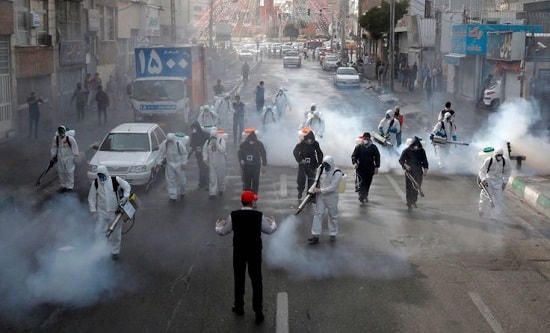
Iran was among the first countries hit hard by the coronavirus pandemic, with its first cases reported in late February. The country was under the imperialist microscope as it responded to the virus. Every step of the way it was subjected to political criticism from the US government and media, who gloated about its mismanagement. US Secretary of State Mike Pompeo stated on 17 March: ‘The Wuhan virus is a killer and the Iranian regime is an accomplice’. A US official told CNN that the pandemic was Iran’s ‘Chernobyl moment’. Iran’s ability to respond to the virus has been undermined from the start by US actions aimed at the destruction of the state, from the long-term impact of years of crippling sanctions and conflict, to interventions aimed to undermine the government whilst the pandemic raged. Despite this, the Iranian response was put in perspective when the virus spread in the US and Western Europe, showing the world what a really incompetent response to a pandemic looks like. TOBY HARBERTSON reports.
Iran has important economic and political links with China, and regular transit of people and goods between the countries is thought to have brought the coronavirus to Iran early in the global pandemic. The first confirmed case was reported in the holy city of Qom on 19 February, a major pilgrimage destination and the world centre of Shia scholarship. BBC Farsi, among other outlets, has alleged that there are serious problems with Iran’s reporting of cases, both because the death rate per case is high, and because a large number of politicians (8% of MPs) and religious figures have died of Covid-19. However, the World Health Organization’s (WHO) Director General, Tedros Adhanom Ghebreyesus, said on 1 March ‘we haven’t seen faults in the statistics.’ Iran’s response to the spread of the virus involved implementing a lockdown and releasing more than 100,000 prisoners. As of 5 June, just over 8,000 people in Iran had died of Covid-19.
On 12 March, soon after the International Monetary Fund (IMF) advertised that it was making $50bn available through the ‘Rapid Financing Instrument’ to support countries’ responses to the pandemic, the Iranian government requested a $5bn loan. The IMF has not granted Iran a loan since the early 1960s – long before the revolution of 1979 – despite the fact that Iran is a member of the body. The US, which has a veto in the IMF, made clear that it would not allow Iran to be granted support. A government official told Middle East Eye, ‘The world’s leading state sponsor of terrorism is seeking cash to fund its adventurism abroad, not to buy medicine for Iranians’ (8 April 2020). The US has made hollow offers of humanitarian aid, prompting Iran’s President Hassan Rouhani to respond that the best form of aid would be to lift the sanctions.
At the height of the pandemic on 18 March the US imposed additional sanctions on Iran, targeting the petrochemical industry. On the previous day Iranian Foreign Minister Mohammad Javad Zarif tweeted that US sanctions ‘literally kill innocents’ and called for countries and businesses to breach them. On 24 March the UN High Commissioner for Human Rights, Michele Bachelet, called for economic sanctions to be lifted on countries such as Iran tackling coronavirus outbreaks. This was followed on 6 April by a call from 24 senior diplomatic figures specifically for the US to loosen sanctions on Iran. The list included four former NATO Secretary Generals, former EU Foreign Affairs chief Federica Mogherini, and the former Director General of the WHO, Gro Harlem Brundtland. No action to relieve the sanctions has yet been taken.
The complexity of the sanctions and the legal response of the US to those deemed to have broken sanctions are scaring businesses and relief organisations from engaging with Iran. The Lancet explains: ‘Essential medicines and medical equipment are technically exempt from sanctions, but their availability is restricted by the effect of sanctions on the commercial sector, reducing manufacturing and trade capacity, and on foreign exchange’ (6 April 2020). Despite some WHO support, Iran has struggled to get hold of adequate protective equipment, medicines, and other essential medical resources. What was once one of the best health care systems in the region has been forced to its knees by US sanctions.
The impact of the sanctions comes alongside a variety of other attempts to subvert the Iranian government, led by the US and backed by its imperialist and regional allies. In what has been described as ‘a new front in information warfare’, the US government has been encouraging Iranians to contact an encrypted messaging line to pass on information about the virus and the government response (CNN 18 March). Liberation News reported that Iran’s official Covid-19 guidance app was removed from the Google Play Store on 10 March without any explanation (15 March 2020). The media has also launched a determined attack. The New York Times described Iran as ‘a worldwide threat’ in relation to the virus (The Independent 27 February 2020). BBC Farsi has consistently attempted to cast doubt on the government’s response to the virus – in stark contrast to the BBC’s meek coverage of the government’s criminal failures in Britain.
Now that the epicentre of the pandemic has shifted to the US and Europe, the hypocrisy of imperialist criticisms of Iran are apparent. The US and British governments, along with their subservient media, seized on the pandemic as a way to undermine Iran in line with their strategic objectives. In reality Iran’s response to the virus was that of a poor and under-resourced capitalist country: class-based and somewhat chaotic, but certainly not among the worst national responses. If the country had been free of US sanctions and the looming threat of imperialist war, the spread of the virus nationally – and potentially globally – could have been slowed or lessened. Lift the sanctions on Iran!




